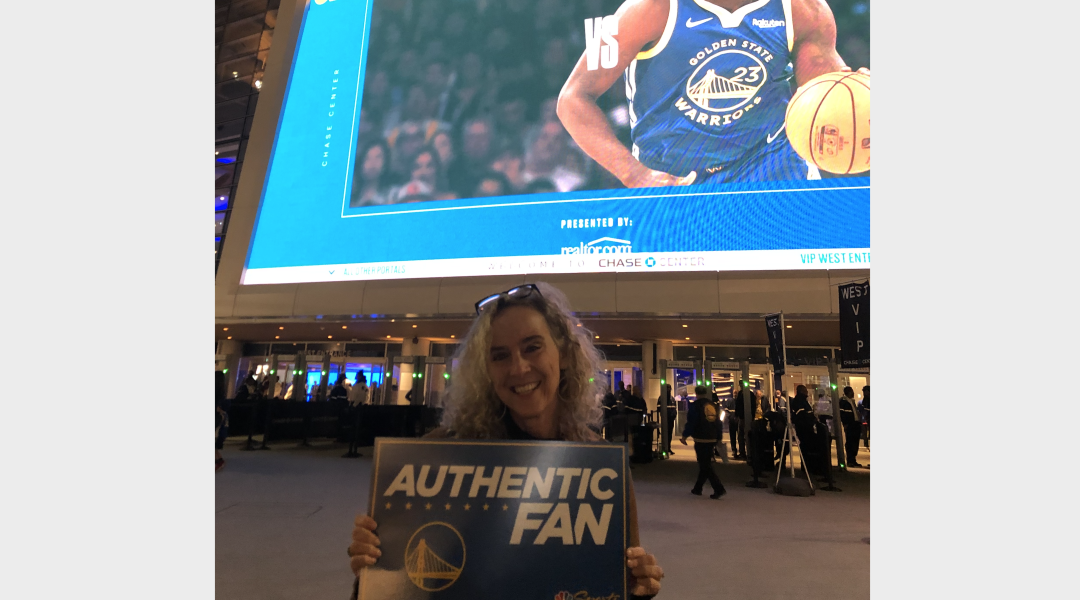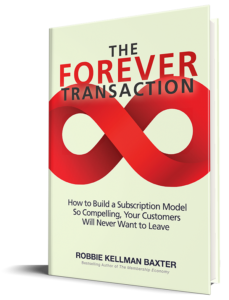When it comes to parenting, I am many things, but I am rarely “the cool mom.”
But last week, I got to take my son on a behind-the-scenes tour of the gorgeous new Chase Center, home of the Golden State Warriors. How did I get so cool you might ask? Especially if you know me!
Don’t worry. I’m still not cool. My visit was actually work related.
We were there to meet Kim Stone, GM of the Chase Center, in person. Kim is featured in my forthcoming book, THE FOREVER TRANSACTION. I had been looking for an example of a sports team that understood the importance of building a deep and lasting relationship with fans. Multiple people recommended I talk to Kim, because of her tremendous accomplishments with the Miami Heat, where she had worked for 23 years prior to running the Chase Center.
Sports fans can be fickle. If their team is winning, they wear the shirt, watch the game, buy the tickets. But if the star player is traded, or hurt, or the team is losing, fans drop off. At least, that’s what usually happens. Especially today, when the opportunities for entertainment, both live and streamed, are virtually infinite. The challenge for the teams is to figure out how to build a relationship with their best fans, the season ticket holders, that transcends the win/loss record.
As Executive Vice President for the Miami Heat, and GM of the American Airlines Arena, Kim made season ticket holders a priority, focusing on maximizing enjoyment among the most engaged fans. They added staff and budget, and recruited a vice president of service from the Four Seasons, an institution synonymous with customer experience at the highest level. Heat representatives were encouraged to build personal relationships with each season ticket member, acting almost as concierges, and empowered to do “whatever it takes” within reason to delight their members — like a Dwyane Wade jersey for a kid’s birthday or flowers for a season ticket holder’s anniversary.
Note the language…season ticket member. I have written extensively on the idea that you don’t need to call your members “members” and that sometimes the word can be charged, but in this case, I think it demonstrates the emotional connection the Heat was making with the people they served and the feeling of belonging and status they wanted to create. For the Heat, it’s about the experience and the connection, not just whether the team is winning or losing, or how many big-name players are on the floor. With or without Shaq on the roster, the Heat stayed relevant to their fans.
Stone pointed out that technology might support the relationship, but can’t be the relationship. The Heat has layered in technology—a mobile app and season ticket member web portal—which provides convenience and utility to season ticket members, but still has relationship at the core. By focusing on the relationship and not just on the W-L record, the Heat was able to build more consistent loyalty to the franchise, in a city where fans had lots of options for a night out.
Now Stone is in the City by the Bay, working to build the same kind of engagement in a city full of demanding and fickle patrons. She’s coming in at a challenging time. After several years of dominance, the Warriors have a mostly new team, and a losing record. Add to that the fact that they’re playing in a new city (SF is not Oakland) and many of the best known players have been injured, and you see how it could be hard to attract people to the games and keep them happy.
But they’re doing it.
They have multiple bundled experiences for fans in all parts of the arena–fans whose feet “touch the floor” have the JP Morgan Lounge, which is spectacular, with buffets of prime rib, sushi, brownies and many other delicious things, and multiple full-service bars. Other fans can enjoy tacos in the cantina, courtside suites with catering, and dozens of vendors offering “food truck” fare (i.e. chef-designed, locally sourced etc). There are small and large parties going on all around the arena.
And there’s an incredible amount of art throughout the arena–from the giant mosaic and LED display as you enter, to the huge collection of concert posters along the halls. You could visit the arena just for the art and not be disappointed.
By layering in value that goes well beyond the game itself, by building direct relationships with the fans and by creating venues for the fans themselves to interact with one another and build community, the Warriors hope to build a culture of membership, regardless of whether they win or lose any one game or season.
Sports franchises aren’t the only organizations that struggle with fickle fans. Theme park attendances surges with a new roller coaster or show. Musicians worry about the next hit song. Movie franchises need blockbusters. Fashion companies want to deliver that “it” t-shirt or shoe.
For any business that is hit-based or win-based, membership can be a great way to refocus your best fans on the ongoing relationship, rather than teaching them to judge you by your most recent results.
****





